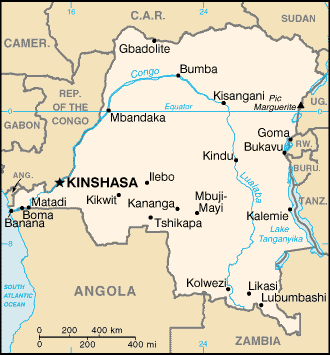DR Congo Constitution Approved
As announced by the BBC here, DR Congo's constitution, for which there was a referendum this past December, has been approved. (This reported by Arnaud Zajtman, a long-time resident and reporter in DR Congo, and of whom it was observed one night at dinner at Chateau Margau, 'He looks like Simon and Garfunkel. Combined.')
What I did not realize is that a new flag would accompany instating the new document. Unlike Rwanda, who, when it chose a new flag, eliminated red due to the association with blood from the war and genocide, the new Congolese flag has added red, as can be seen here in a photo from the BBC article:

The blue is to symbolize peace, and the red, in this case, is to commemorate the estimated 4 million Congolese who have lost their lives due to the years of conflict.
The new Constitution is not expected to go into full effect until after the presidential elections in June. Municipal elections begin in April, and the end of June is the mandated deadline for the extension of the original deadline that would see elections as the end of the Transition Period that has lasted since 2003.
However, one important point will be in effect: The minimum age to run for President has been lowered to 30, so that 33-year old Joseph Kabila, who has served as President during the transition and is the son of the assassinated previous president, Laurent Desire Kabila. Though "Kabila Father"'s term was cut short, Mobutu Sese Seko was in power for over 30 years. Thus, the new Constitution calls for a limit of 2 five-year terms.
I have posted previously on related issues, and have received questions/critique in the line of, "Don't you think that other issues are more important to address to create order and stability in DR Congo?"
Yes there are other issues, but perhaps none so important as this. Although the process is funded and overseen by outside constituents (i.e., the European Union, the Independent Electoral Commission, the Department for International Development (DfID-UK)), it is still an important step for Congolese. The electoral process would not take place without the funding provided by myriad sources, and represents two serious events in one:
-- The first free elections in over 40 years; before 40 years ago, there were few elections at all, because DR Congo was a Belgian colony prior to 1960.
-- The first legitimate elections, after which its leaders will be held accountable by said constituents; this accountability will go a long way toward establishing stability and upholding the rule of law, not to mention inspiring confidence of investors who will hopefully contribute to a much-needed economic upswing.


0 Comments:
Post a Comment
<< Home